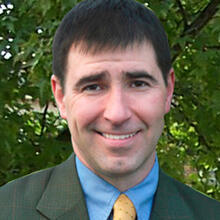Yesterday we attended a Good Friday justice walk modeled on the Stations of the Cross. Living in a new town, I had hoped that it would provide an entry into the suffering, struggles, and salvation of this place. It was sponsored by a broad coalition of local churches and justice groups. There certainly were people there who know the community deeply.
Introducing newcomers to the passions and resurrections of Dayton was not, of course, its purpose. Within the frustration of my simplistic desire for a quick local mystagogy, there is, I suspect, a deeper lesson about incarnation and salvation.
Local knowledge is not easily had. GoogleEarth and Yelp are but the latest purveyors of the illusion of easy comprehension. But they give us only superficial knowledge: views from above, lively democratic discourse on restaurants.
The history, struggles, and achievements of a place are not available in that way. They are known only slowly in engagement and relationships. But even then, knowledge remains partial. Perspectives and experiences differ. Communities are divided.
Deeper still, we face the fundamental opaqueness of life. Even the most local of histories only draw upon that small fraction of life that becomes public and shared. The rest remains hidden in what the Jesuit Michel de Certeau called the “haunting” of human spaces: memories of how the children played here, the snow covered the trees there, of a thousand small kindnesses and petty cruelties, unspoken needs of flesh answered and ignored, hopes dashed and fulfilled.
These myriad memories never rise into the coherence of history, yet they form the bulk of our lives and the world where live them. They are certainly the field where salvation unfolds. Here, I think, is a lesson about the Paschal mystery. Prior to any effort to explain the incarnation, to make sense of Jesus’ cross and our salvation, there are the brute realities of God becoming flesh, of Jesus’ life, death, and resurrection. For all that can and must be said about these, our words illuminate little of the vast territory of salvation. A territory that is perhaps never fully known; given mainly in the living.
In a another essay of de Certeau, “White Ecstasy,” an old monk describes to a visitor, the mystic experiences reported by those who set out to see God: “the absorption of objects and subjects in the act of seeing….the unfolding of presence. Neither fold nor hole. Nothing hidden and thus nothing visible.”
The visitor does not respond with surprise. In his country this experience is commonplace. “Everything there is already overcome by clarity.” He is from the “shadowless plane” of “Panoptie” where all is visible…a land not distant from our own.
The essay is easy to read as an invocation of apophasis, a union with God beyond knowing. But the old monk does not identify with these experiences. He clings instead to “secrets, to stubborn details, to spots of shadow that protect things, and ourselves from universal transparency.” The miseries of old age provide such “odd intimacies” deformities and misfortunes “the brute brusqueness of a body unknown to others.”
The creator of our mute secrets, preserves, loves, and redeems them. Salvation’s most public moment reveals the opaqueness of Jesus' own flesh suffering on the Cross. His resurrection curiously unpublic, reaches far broader, into the haunted corners, the secret burdens and joys of all flesh.







